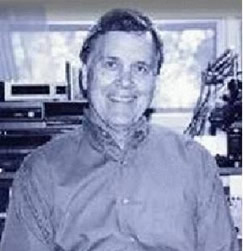 When Mike Flynn was a boy, he sat in his bedroom on the Kansas prairie, turning the dial on his radio and marveling that a voice from Chicago could reach so far.
When Mike Flynn was a boy, he sat in his bedroom on the Kansas prairie, turning the dial on his radio and marveling that a voice from Chicago could reach so far.
Now it is Flynn’s voice that reaches listeners across the nation. His syndicated weekly radio show, The Folk Sampler, is heard on stations from West Virginia to Alaska. “From the foothills of the Ozarks,” the show starts out, “this is the Folk Sampler. I’m Mike Flynn.”
The Siloam Springs resident has been broadcasting his show for over 20 years. Before that, the retired John Brown University professor worked in television, anchoring a news show for a Tulsa, Okla., station for 15 years. Flynn knew from the time he was a seventh-grader that broadcasting was the career for him, he said. A supportive teacher in the ninth grade cemented that goal. Flynn studied a year at John Brown University, another year at the University of Tulsa and then moved to Chicago, where he encountered ethnic culture for the first time.
He met ethnic people, ate ethnic food and heard ethnic music. The radio stations there were full of it – gospel, Puerto Rican, Polish, Irish, Jewish and German. “All of this stuff seemed so fascinating to me. And I loved it,” Flynn said. Then a friend brought him a recording of bluegrass greats Lester Flatt and Earl Scruggs. Flynn was hooked.
He began playing the guitar, attending classes at the Old Town School of Folk Music. “Chicago was the place to discover traditional roots music,” Flynn said. This was during the late 1950s, before such music was heard on mainstream radio. Then Pete Seeger and the Kingston Trio hit the airwaves, along with groups such as The Weavers and Odetta. Folk music entered the public domain.
Flynn started the original version of The Folk Sampler — and it had that name — as a 15-minute feature on the more traditional radio station he worked on at the time. Station owners and the audience hated the show, Flynn said. It was canceled after 13 programs.
Flynn returned to Tulsa, which he considers his home base, a year or so later. He completed his broadcasting degree at the University of Tulsa and went to work for KOTV, reporting the news and working as an anchorman. Those were turbulent years, encompassing the Civil Rights Movement, the Vietnam War and a decade of economic and social upheaval. He liked the excitement and challenge of television news, Flynn said, but slowly the long hours, demanding pace and constant public recognition began to wear on him.
Another old dream resurfaced in his mind, the dream of being a teacher. Flynn wondered if there weren’t a different way to make an impact on the world, a way that would, “make me feel better at the end of the day.” “Teaching was a lifestyle that appealed to me a great deal — aesthetically, emotionally, spiritually, in every way.” He remembered the influence Mrs. Finney had on him in the ninth grade and decided to try to pass that on.
He met the president of JBU while working on a news story and mentioned his desire to teach. A year later, John Brown Jr. called him. Flynn went to work in the JBU communications department, which he eventually chaired. “I loved every minute of it,” Flynn said. He stayed at JBU 22 years, until his retirement in 1999. “It was as satisfying to me as I had hoped it would be. “Watching 20-year-old kids figure things out was just great fun.”
In 1978, Flynn decided to revive his interest in folk music. He started The Folk Sampler again, syndicating the show four years later. Today it is heard on about 100 stations nationwide. The Folk Sampler plays a mix of traditional music, folk, bluegrass and blues. Each program revolves around a theme, anything from trains to holidays to the anguish of love. Generating themes is easy, Flynn said. He uses the themes as a way to explore ideas in his own mind. Much of folk music is social or political, Flynn said. As a young man, he heard musicians such as Bob Dylan grating out protests to war.
“I happen to feel that the music (of the 1960s) had a great impact,” Flynn said. He wants to help that tradition of social activism continue. Many of the issues he explores have serious overtones, such as child abuse, ecology and tolerance.
“What I really use this platform for is to espouse my own social and cultural views. I don’t want to preach outright, but I have political and social feelings and I’m not afraid to play songs that address some of those issues.”
“One thing I’ve always loved about this music is that it deals with real issues. Very earthy, strong gut issues that we deal with on a daily basis … I hope that if nothing else, this music helps people to think seriously about these issues.”
You can hear Mike Flynn on:
Saturdays
9:00 PM – 10:00 PM with Folk Sampler